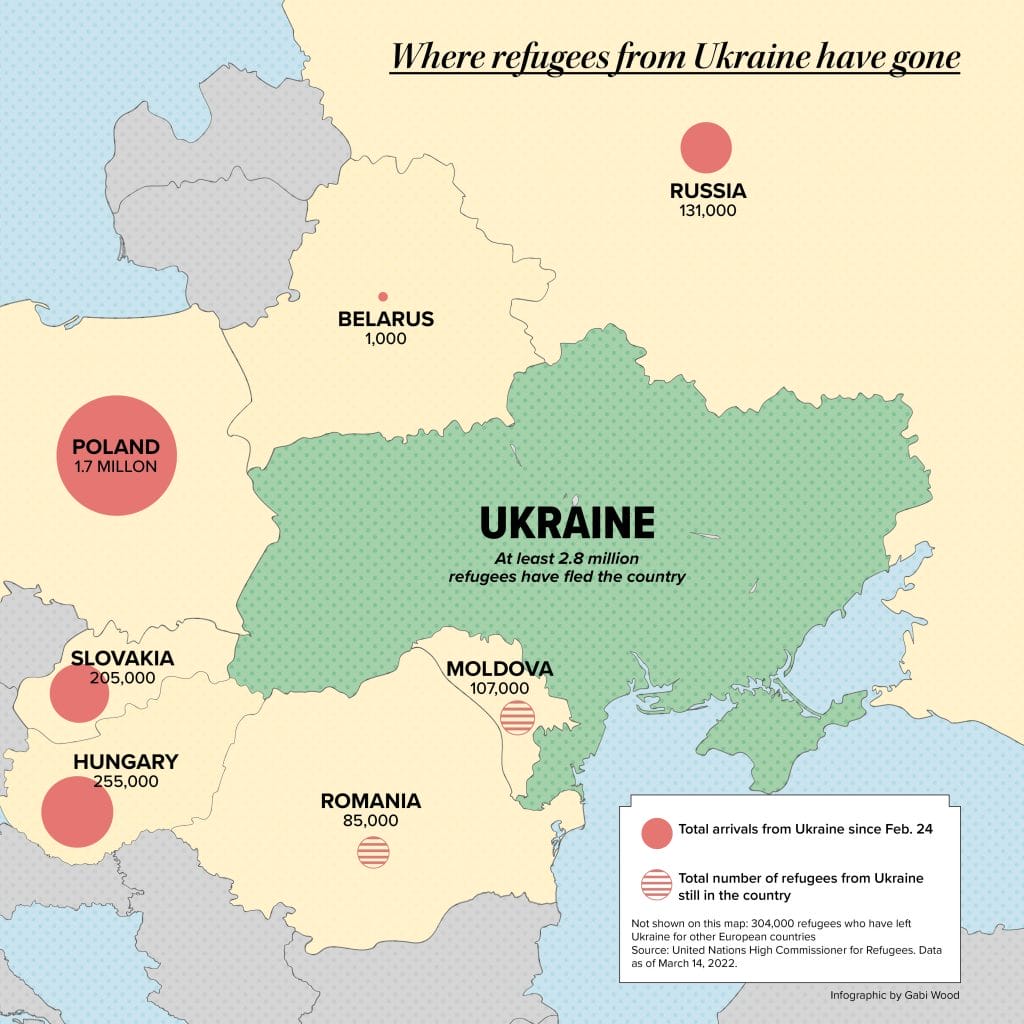‘It didn’t feel real,’ Ukrainian students grapple with Russia-Ukraine War

Infographic by Gabi Wood
Sahara Sriraman, Contributing Writer
Interdisciplinary studies senior Masha Timina said they recently saw a video of Russian soldiers in the Ukrainian neighborhood where they grew up and where their grandparents currently live.
“It just kind of progressively got worse,” Timina said. “It was bad the first few days, it was very much a jarring experience; at first, it didn’t feel real.”
Timina said they lived in Kyiv, Ukraine’s capital, until they were eight-years-old and visited Kyiv every summer to see family before the COVID-19 pandemic.
Since Russian troops invaded Ukraine on Feb. 24, there have been hundreds of casualties and millions of people displaced, according to the International Rescue Committee. The International Rescue Committee stated the war is “the worst humanitarian crisis Europe has seen in decades.”
Timina said they suspected Russia would invade Ukraine because of the conflict leading up to the invasion. They watch the news to stay updated on what’s happening in the region as the invasion progresses.
“It’s definitely part of a collective traumatic experience and it’s interesting to see myself go through this outside of that situation but still adjacent to it,” Timina said.
Timina said they’re disappointed that Ukraine is “only” getting media attention now when the country is being attacked, as they said there is much Ukrainian culture and history people don’t know. However, they’re glad the invasion is being discussed in the news.
“In the back of my head, I was wondering if it would become such a constant thing, people would just forget that it was happening,” Timina said. “But I think because it’s a representation of what could possibly happen to the rest of the world, everyone is a little bit on edge.”
Judy Twigg, a political science professor who specializes in Russian politics, said the war also shows how conflicts between democratic and authoritarian governments can affect foreign affairs, as Ukraine is a liberal democracy and Russia operates under an authoritarian regime.
“This is a fight for the principles that we say we believe in,” Twigg said. “We have lots of reasons to be paying attention and supporting Ukrainians because they are fighting for our way of life and our system of government.”
Twigg said she believes if the conflict between Russia and Ukraine persists, the United States will continue to impose economic sanctions on Russia.
“That’s intended to put pressure on Russia to get them to change their mind, to change course, to stop this aggressive behavior,” Twigg said.
President Biden has announced the U.S.’s support of Ukraine and condemned Russia’s actions, and introduced a number of economic sanctions, such as a ban on imports of Russian oil, according to the White House. Many companies, including Starbucks, McDonald’s and Pepsi have independently suspended operations in Russia, according to National Public Radio.
Twigg said there are a lot of different outcomes that could happen with this crisis, the worst-case scenario being Russia takes over Ukraine and causes more destruction. She said if this happens, though, the Russian economy will be negatively affected because the rest of the world will cut off economic ties with the country.
Twigg said the best-case scenario is that the Russian people and those close to Russian President Vladimir Putin push for a regime change and demand he stop the invasion.
Bill Newmann, a political science professor, said this conflict also poses a national security risk for the U.S. He said the war could turn into a world war if it continues to escalate and Russia invades a NATO, or North Atlantic Treaty Organization, country. However, he said the U.S. will not militarily defend Ukraine.
“The possibility that this war expands outside of Ukraine and into Poland, for instance, would bring the United States, by its obligations and by its own national interest, directly into conflict,” Newmann said.
Olena Lloyd, a clinical social work master’s student, said she is from Vinnytsia, Ukraine and has been living in the U.S. with her son since 2014.
Lloyd said she feels the war is an ongoing extension of Russia’s invasion and annexation of Ukraine’s Crimean Peninsula in 2014.
“I remember we were desperately begging the world to ‘don’t be silent, help us to spread information’ and we didn’t get as much support,” Lloyd said. “And, fortunately, we do now but what it is cost us is just incredible.”
She said her mother, sister, niece and nephew are still living in Ukraine. Lloyd said her mother told her she doesn’t want to leave her home, but might change her mind after seeing the bombings of Ukrainian cities.
Lloyd said transportation out of Ukraine is very difficult, especially for young children. She said her sister’s family has had to stay in shelters and that because her nephew is disabled, her sister worries she will not be able to get medical care for him.
“There’s no transportation, you can’t just plan your trip,” Lloyd said. “And to pack a bag and take two little kids. It’s just incredibly challenging.”



This war has changed each of us. The whole world is now helping Ukraine with all its might, this is a colossal support. No less important are the sanctions that Russia is now receiving, because this greatly affects their economy, many companies stop working in Russia, I advise you to learn more about this here https://www.youtube.com/watch?v=o7p4YJEqAtU&t=2s
No one expected war, it took each of us by surprise. But we will survive everything, with such colossal support as this https://engre.co/news/articles/support-cases-of-evo-and-eleek/ – the victory is definitely ours.